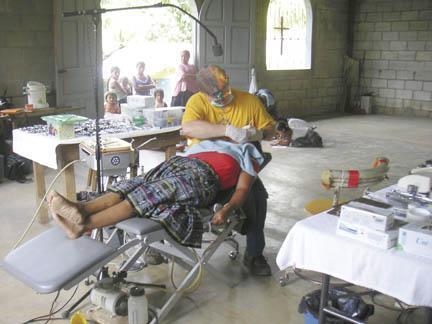Sending smiles abroad
While other children look on with nervousness and curiosity, Federal Way dentist Ken Brossel works on a young patient in a make-shift dental clinic in Izabal, Guatemala. Brossel worked abroad as part of the Rotary Dental Clinic, an organization founded in 1989 to export dentistry to children in needy countries. <b>Photo by Seth Bynum </b>
Wed, 08/16/2006
On a recent steamy day in Izabal, Guatemala, dentists loaded a compressor, generator, boxes of supplies and folding dental chairs in a Mitsubishi double cab four-wheel drive truck and headed out for their day's work.
Setting up a mobile clinic in churches, abandoned buildings, village homes, or if necessary, under a shady tree, the dentists, volunteers for the Rotary International Dental Clinic treat patients who walk for miles and wait in long lines to see them.
In July, local dentist Ken Brossel was one of those volunteers. He and his wife Karol, along with their two children, Karl and Kara, went for three weeks, and all four Brossels cherished the trip.
"The patients were very happy to see a dentist!" said Karl, 18. "And the country is so beautiful, I loved it."
"I felt very appreciated," added Dr. Brossel.
The Rotary Dental Clinic was founded in 1989 by a couple from Watertown, Wisconsin, Dr. Robert and Lois Liners, and sponsored by the Watertown Rotary Club. Since then, dentists from 20 countries have come to donate their time and expertise, and the clinic is continually staffed on 30-day rotations.
Prior to the arrival of the clinic, there was no dental care available to the approximately 70,000 Q'ueqchi Indians of the Izabel region. Now the clinic treats an average of 5,600 patients each year.
The base clinic in Semaji, Guatemala, serves patients on Mondays and during the rest of the week, the volunteer dentists head out to the rugged countryside, traveling to isolated areas in the rain forest. Up to 60 remote villages are visited at least one a year.
Missionary priests and staff of a local Catholic parish, the Parroquia San Antonio de Padua, provide logistical support and serve as hosts to the dentists.
"In the patients I saw, the biggest issue is extensive dental decay. Cola is cheaper than water in that region, coffee is consumed in great amounts, and the people have the habit of chewing on sugar cane. By the time they are teenagers, many children have little black stumps for teeth," said Dr. Brossel.
While the volunteer dentists perform many tooth extractions to relieve pain, they also promote dental education and hygiene. The clinic directors say that their efforts over the past 17 years are starting to pay off. In the past year, for every 300 extractions, there were 250 fillings.
"It was a fantastic experience, and there is much work to be done there," said Dr. Brossel. "I'm definitely going back."


